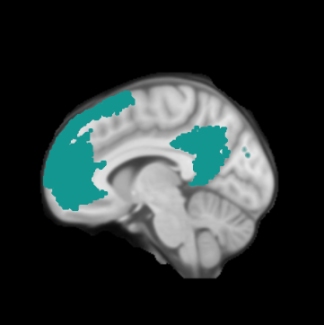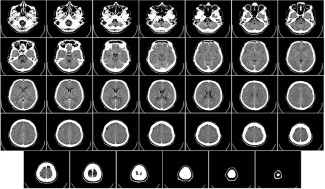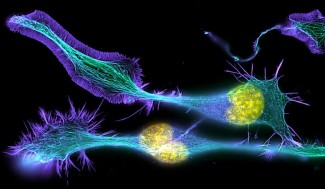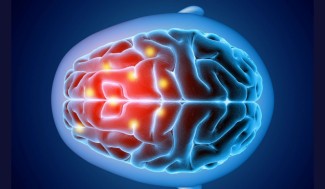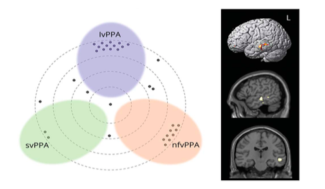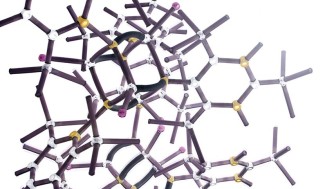Frontotemporal degeneration (FTD), also known as frontotemporal dementia or Pick’s disease, refers to a set of cognitive and behavioural neurodegenerative diseases. Around 6,000 patients suffer from this condition in France. FTD affects men and women equally, and accounts for around 10% of all dementia cases. The first symptoms generally appear between the ages of 50 and 65. Symptoms of the disease include behavioural, emotional and language disorders.
Biological mechanisms and causes of frontotemporal degeneration
Around 50% of frontotemporal dementias are hereditary, caused by a genetic mutation carried by genes located on different chromosomes. These genes code for proteins such as progranulin, the tau protein and others whose role is still largely unknown.
The symptoms of FTD originate from a malfunction in the frontal and temporal regions of the brain. These regions of the brain are involved in functions ranging from behaviour, particularly social behaviour, to initiative-taking and control of emotions and language. In these conditions, the brain areas affected by the disease reduce (atrophy) as a result of neuronal death caused by the accumulation of abnormal proteins, or by other mechanisms that are still poorly understood.
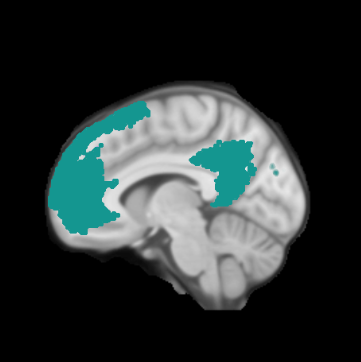
Frontotemporal degeneration symptoms and diagnosis
Frontotemporal degeneration usually presents as behavioural, personality and language disorders. It is a progressive condition whose rate of progression to severe dementia will vary from case to case.
At disease onset, the symptoms of FTD can be attributed to
‘mental fatigue’, and some patients will present with uninhibited behaviours, for example a loss of control over their actions and their words, including being inappropriately familiar with strangers and excessively jovial. Others will exhibit obsessive-compulsive behaviours, a tendency towards aggression, or anorexia or bulimia.
Language problems are generally observed in all patients. This can either be due to an inability to express oneself, or problems with comprehension and identifying objects or people. Memory and motor functions are generally preserved at disease onset. Frontotemporal degeneration is initially suspected by friends and relatives of the patient, who notice recent changes in behaviour, a change in personality or language difficulties. Diagnosis of this disease is often differential, to rule out other dementias or psychiatric disorders. It is based on the symptoms that the patient presents during a neurological consultation. In some cases, a brain imaging scan or MRI scan is needed to assess the degree of atrophy (loss of volume) in the brain.

Treatment for frontotemporal degeneration
There is no specific cure for FTD. Therapies suggested are designed to alleviate symptoms and improve the patient’s daily life, and that of their families. Patients are cared for by a multidisciplinary team of specialists, neuropsychologists, speech therapists and clinical psychologists. This is best carried out at specialist FTD centres.

Dans un contexte où les maladies neurodégénératives représentent un défi médical et sociétal croissant, la recherche menée à l’Institut du Cerveau s'intéresse plus particulièrement à l'amélioration de la prise en charge de ces pathologies complexes. Ainsi, l'Institut concentre ses efforts sur trois axes majeurs :
- affiner le diagnostic précoce des maladies du système nerveux,
- identifier des biomarqueurs spécifiques permettant de distinguer les différentes formes pathologiques — qu’elles soient liées à la protéinopathie TDP-43, TAU ou FUS,
- développer des traitements innovants, y compris pour les formes non génétiques de ces affections.
À travers une approche rigoureuse et multidisciplinaire, les équipes de l’Institut du Cerveau œuvrent à mieux comprendre les mécanismes biologiques à l’œuvre, dans l’objectif de transformer ces connaissances fondamentales en thérapies efficaces. Cette dynamique de recherche continue constitue un espoir concret pour les patientes et patients ainsi que pour leurs familles.
Support Paris Brain Institute
Did you like this content and did it answer the questions you were asking? Don't hesitate to support Paris Brain Institute.
Fiche mise à jour avec la collaboration d'Isabelle Le Ber, neurologue, chercheuse dans l'équipe Frontlab à l'Institut du Cerveau et coordinatrice du centre de référence démences rares et précoces.

